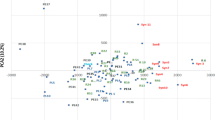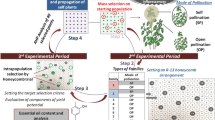Abstract
Castor (Ricinus communis L.) is a highly cross pollinated crop and for the first time breeding efforts through single seed descent (SSD) were done in castor in India. The improvement effects of SSD is compared to pedigree selection (PS) method which is commonly followed. A cross between two diverse parents, VP-1 and 48-1 was attempted and further selections were made both through SSD and PS methods. Sixty lines, 30 each generated by SSD and PS methods were evaluated for agronomic traits and yield potential along with two checks in two separate sets for 2 years under rainfed conditions. The data was subjected to descriptive statistics, genetic parameters, pooled ANOVA using SAS/STAR software, principal component analysis etc. to compare the efficacy of SSD and PS methods. Ten elite lines of SSD and 11of PS method recorded 128% and 89% seed yield increase over the male parent. Two methods of selection per se were not significantly different while effect of selection method as indicated by interaction of methods with lines was significant for pooled mean seed yield. Moderate to low GCV and PCV and high heritability were observed for most of the traits studied in both the methods. The trends of genetic gain from selection was different in both the methods for days to 50% flowering, hundred seed weight and seed yield at 120 DAS. The present study indicated that SSD breeding method is equally effective, efficient and less expensive than PS in producing diverse elite parental lines in highly cross pollinated crop like castor through artificial selfing.
Similar content being viewed by others
Abbreviations
- PS:
-
Pedigree selection method
- SSD:
-
Single seed descent selection method
- DAS:
-
Days after sowing
References
Alemaw G, Kassahun BM, Taye G, Endalamaw C (2014) Phenotypic variability in Ethiopian castor (Ricinus communis L.) accessions. Int J Adv Biol Biomed Res 2(12):2909–2914
Allan G, Williams A, Rabinowicz PD, Chan AP, Ravel J, Keim P (2008) Worldwide genotyping of castor bean germplasm (Ricinus communis L.) using AFLPs and SSRs. Gen Res Crop Evol 55(3):365–378. https://doi.org/10.1007/s10722-007-9244-3
Allard R (1960) Principles of plant breeding. Wiley, New York
Boughey H, Jinks JL (1978) Joint selection for both extremes of mean performance and of sensitivity to macro-environment variable III. The determinants of sensitivity. Heredity 40:363–369
Brim CA (1966) A modified pedigree method of selection in soybean. Crop Sci 6:222–283
Brumpton RJ, Boughey H, Jinks JL (1977) Joint selection for both extremes of mean performance and of sensitivity to a macro-environmental variable. I. Family selection. Heredity 30:219–226
Burton GW (1952) Quantitative inheritance in grasses. In: Wagner RE (ed) Proceedings of 6th international grassland congress, pp 277–283.
Cooper JP (1982) Plant breeding for different climates. In: Blaxter SK, Fowden LD (eds) Food nutrition and climate, vol 1. Applied Science Publishers, London, pp 79–99
Dahiya BS, Sekhar MJ, Swaramurthy SE, Naidu MR, Bail M (1986) Selection procedures in chickpea breeding. In: Gupta PK, Bahl JR (eds) Proceedings of the symposium on advances in genetics and crop improvement, Meerut, December 1984. Rastogi and Company, India, pp 63–75
Dapke JS, Naik MR, Vaidya GB, Vanve PB, Narwade AV, Rajkumar BK (2016) Genetic variability in castor (Ricinus communis L.). Eur J Biotechnol Biosci 4(4):39–40
Funada M, Helms TC, Hammond JJ et al (2013) Single-seed descent, single-pod, and bulk sampling methods for soybean. Euphytica 192:217–226. https://doi.org/10.1007/s10681-012-0837-3
Gill JS, Verma MM, Gumber RK, Brar JS (1995) Comparative efficiency of four selection methods for deriving high yielding lines in mungbean [(Vigna radiata L.) Wilczek]. Theor Appl Genet 90(3):554–560
Gill JS, Gumber RK, Verma MM, Rathore P (2000) Genetic estimates of advanced mungbean lines derived through different selection methods. Crop Improv Soc 27(1):88–98
Golakia PR, Kavani RH, Monapara BR (2007) Genetic variation and trait relationship in castor. Natl J Plant Improv 9(1):60–62
Ibrahim HM (2015) Effectiveness of breeding methods for production of superior genotypes and maintenance of genetic variance in faba bean (Vicia faba L.). Am J Life Sci 3(1):11–16
Inagaki MN, Varughese G, Rajaram S, Ginkel MV, Mujeeb-Kazi A (1998) Comparison of broad wheat lines selected by double haploid, single seed descent and pedigree selection methods. Theor Appl Genet 97:550–556
Johanson HW, Robinson HF, Comstooc RE (1955) Estimates of genetic and environmental variability in soybeans. Agron J 47:314–318
Jumbo M, Weldekidan T, Holland JB, Hawk JA (2011) Comparison of conventional, modified single seed descent and doubled haploid breeding methods for maize inbred line development using germplasm enhancement of maize breeding crosses. Crop Sci 51:1534–1543. https://doi.org/10.2135/cropsci2010.10.0594
Lakshmamma P, Lakshmi P, Mohan YC, Lavanya C (2005) Genetic variability and character association in castor (Ricinus communis L.). Natl J Plant Improv 7(2):122–130
Lavanya C, Mukta (2008) Varieties and hybrids of castor. Directorate of Oilseeds Research, Hyderabad. ICAR-Directorate of Oilseeds Research, p 88
Lavanya C, Solanki SS (2010) Crop improvement of castor: the challenges ahead. In: Hegde DM (ed) Research and development in castor: present status and future strategies. Ind. Soc. Oilseeds Res, Hyderabad, pp 36–55
Lavanya C, Varaprasad KS (2012) Castor hybrids in India: a success story. Seed Times 5(4):111–117
Lavanya C, Anjani K, Ganga Rao NVPR (2006) Crop improvement. In: Hegde DM (ed) Research Achievements in Castor. All India Coordinated Research Project on Castor. Directorate of Oilseeds Research, pp 8–37
Lavanya C, Reddy AVV, Dutta B, Bandopadhyay R (2018) Classical genetics, cytogenetics, and traditional breeding in castor bean. In: Kole C, Rabinowicz P (eds) The castor bean genome. Springer, Cham, pp 333–365. https://doi.org/10.1007/978-3-31997280-0
Liv S, Auld DL, Baldanzi M, Cândido MJD, Chen G, Crosby W, Tan D, He X, Lakshmamma P, Lavanya C, Machado OLT, Mielke T, Milani M, Miller TD, Morris JB, Morse SA, Navas AA, Soares DJ, Sofiatti V, Wang ML, Zanotto MD, Zieler H (2012) A review on the challenges for increased production of castor. Agron J 104:853–880
Martinez FJ, Dominguez-Giménez J, Jimenez-Ramirez A, Hernandez L (1986) Use of the single seed descent method in breeding safflower (Carthamus tinctorius L.). Plant Breed 97:364–367
Meena HP, Kumari J (2012) Relative efficiency of different breeding methods for crop improvement of yield and yield components in chickpea (Cicer arietinum L). J Food Legumes 25(3):165–170
Mehta DR, Vashi PS (1997) Variability, heritability and genetic advance in castor. Agric Sci Dig 17:236
Miladinovic J, Burton J, Tubic SB, Miladinovic D, Djordjevic V, Djukic V (2011) Soybean breeding: comparison of the efficiency of different selection methods. Turk J Agric For 35:469–480
Moshkin VA (1986) Castor. Oxonian Press Pvt, Ltd., New Delhi, p 315
Ogunniyi DS (2006) Castor oil: a vital industrial raw material. Bio Resour Technol 97(9):1086–1091. https://doi.org/10.1016/j.biortech.2005.03.028
Panse VG (1957) Genetics of quantitative characters in relation to plant breeding. Indian J Genet 17:318–328
Patel PS, Jaimini SN (1988) Variability in castor (Ricinus communis L.). Ind J Agric Sci 58(5):394–396
Patel JR, Saiyed MP, Patel CG, Bhatt RK, Bhatt JP (2010) Genetic variability and correlation studies in castor (Ricinus communis L.). Int J Agric Sci 6(1):129–131
Rahman MA, Bahl PN (1985) Comparison of single seed descent, mass selection and random bulk methods in chickpea. Ind J Genet 45:186–195
Rao PVR, Shankar VG, Reddy AVV (2009) Variability studies in castor (Ricinus communis L.) Res. Crops 10:696–698
Salas G, Friedt W (1995) Comparison of pedigree selection and single seed descent for oil yield in linseed (Linum usitatissimum L.). Euphytica 83:25–32
Salihu BZ, Falusi AO, Gana AS, Adebola MO, Daudu OY (2017) Estimation of heritability and predicted genotype mean for seed yield of castor (Ricinus communis L.) using best linear unbiased prediction (BLUP). J Plant Dev 24:51–65
Santhalakshmi MP, Raoof MA, Giribabu P, Anjani K, Lavanya C, Varaprasad KS (2014) Castor wilt. A monograph. ICAR-Directorate of Oilseeds Research, Hyderabad, p 34
Sarada C, Alivelu K, Sambasiva VR, Babu SNS, Varaprasad KS (2015) Oilseeds statistics a compendium. ICAR-Indian Institute of Oilseeds Research, Hyderabad
Sarutayophat T, Nualsri C (2010) The efficiency of pedigree and single seed descent selections for yield improvement at generation 4 (F4) of two yardlong bean populations. Kasetsart J (Nat Sci) 44:343–352
Sevugaperumal S, Rungasamy P, Muppidathi N (2000) Genetic variability, correlation and path coefficient analysis in castor. Madras Agric J 86:456–458
Snape JW, Simpson E (1984) Early generation selection and rapid generation advancement methods in autogamous crops. In: Lange W, Zeven AC, Hofenboom NG (eds) Efficiency in plant breeding. Proceedings of the 10th congress of the Eucarpia, Wageningen, The Netherlands, pp 82–86
Suresh G, Lavanya C, Duraimurigan P, Santhalakshmi MP, Manjunatha T, Lakshmi P, Jawahar JL, Reddy AVV (2020) Castor: production technology, 7th revised edn. ICAR-Indian Institute of Oilseeds Research, Hyderabad, p 26
Zheng L, Qi JM, Fang PP, Su JG, Xu JT, Tao AF (2010) Genetic diversity and phylogenetic relationship of castor as revealed by SRAP analysis, in Chinese with English abstract). Wuban Zhiwuxue 28:1–6
Acknowledgements
This work was supported by ICAR-Indian Institute of Oilseeds Research, Hyderabad.
Funding
The research work was supported and funded by the ICAR-Indian Institute of Oilseeds Research, Hyderabad.
Author information
Authors and Affiliations
Corresponding author
Ethics declarations
Conflict of interest
There are no issues regarding potential conflicts of interest, either financial or non-financial.
Informed consent
Done.
Additional information
Publisher's Note
Springer Nature remains neutral with regard to jurisdictional claims in published maps and institutional affiliations.
Rights and permissions
About this article
Cite this article
Lavanya, C., Ushakiran, B., Sarada, C. et al. Use of single seed descent versus pedigree selection for development of elite parental lines in castor (Ricinus communis L.). Genet Resour Crop Evol 68, 295–305 (2021). https://doi.org/10.1007/s10722-020-00985-6
Received:
Accepted:
Published:
Issue Date:
DOI: https://doi.org/10.1007/s10722-020-00985-6




